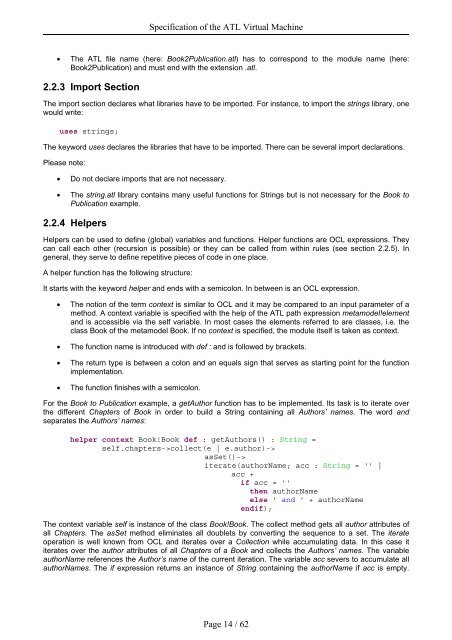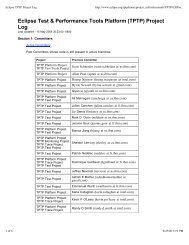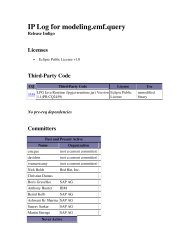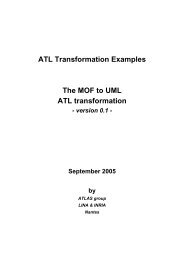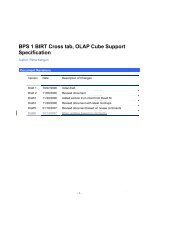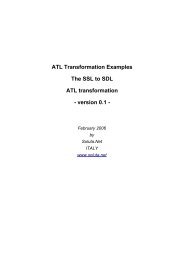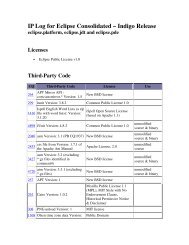ATL: Atlas Transformation Language Specification of the ... - Eclipse
ATL: Atlas Transformation Language Specification of the ... - Eclipse
ATL: Atlas Transformation Language Specification of the ... - Eclipse
You also want an ePaper? Increase the reach of your titles
YUMPU automatically turns print PDFs into web optimized ePapers that Google loves.
<strong>Specification</strong> <strong>of</strong> <strong>the</strong> <strong>ATL</strong> Virtual Machine<br />
• The <strong>ATL</strong> file name (here: Book2Publication.atl) has to correspond to <strong>the</strong> module name (here:<br />
Book2Publication) and must end with <strong>the</strong> extension .atl.<br />
2.2.3 Import Section<br />
The import section declares what libraries have to be imported. For instance, to import <strong>the</strong> strings library, one<br />
would write:<br />
uses strings;<br />
The keyword uses declares <strong>the</strong> libraries that have to be imported. There can be several import declarations.<br />
Please note:<br />
• Do not declare imports that are not necessary.<br />
• The string.atl library contains many useful functions for Strings but is not necessary for <strong>the</strong> Book to<br />
Publication example.<br />
2.2.4 Helpers<br />
Helpers can be used to define (global) variables and functions. Helper functions are OCL expressions. They<br />
can call each o<strong>the</strong>r (recursion is possible) or <strong>the</strong>y can be called from within rules (see section 2.2.5). In<br />
general, <strong>the</strong>y serve to define repetitive pieces <strong>of</strong> code in one place.<br />
A helper function has <strong>the</strong> following structure:<br />
It starts with <strong>the</strong> keyword helper and ends with a semicolon. In between is an OCL expression.<br />
• The notion <strong>of</strong> <strong>the</strong> term context is similar to OCL and it may be compared to an input parameter <strong>of</strong> a<br />
method. A context variable is specified with <strong>the</strong> help <strong>of</strong> <strong>the</strong> <strong>ATL</strong> path expression metamodel!element<br />
and is accessible via <strong>the</strong> self variable. In most cases <strong>the</strong> elements referred to are classes, i.e. <strong>the</strong><br />
class Book <strong>of</strong> <strong>the</strong> metamodel Book. If no context is specified, <strong>the</strong> module itself is taken as context.<br />
• The function name is introduced with def : and is followed by brackets.<br />
• The return type is between a colon and an equals sign that serves as starting point for <strong>the</strong> function<br />
implementation.<br />
• The function finishes with a semicolon.<br />
For <strong>the</strong> Book to Publication example, a getAuthor function has to be implemented. Its task is to iterate over<br />
<strong>the</strong> different Chapters <strong>of</strong> Book in order to build a String containing all Authors’ names. The word and<br />
separates <strong>the</strong> Authors’ names:<br />
helper context Book!Book def : getAuthors() : String =<br />
self.chapters->collect(e | e.author)-><br />
asSet()-><br />
iterate(authorName; acc : String = '' |<br />
acc +<br />
if acc = ''<br />
<strong>the</strong>n authorName<br />
else ' and ' + authorName<br />
endif);<br />
The context variable self is instance <strong>of</strong> <strong>the</strong> class Book!Book. The collect method gets all author attributes <strong>of</strong><br />
all Chapters. The asSet method eliminates all doublets by converting <strong>the</strong> sequence to a set. The iterate<br />
operation is well known from OCL and iterates over a Collection while accumulating data. In this case it<br />
iterates over <strong>the</strong> author attributes <strong>of</strong> all Chapters <strong>of</strong> a Book and collects <strong>the</strong> Authors’ names. The variable<br />
authorName references <strong>the</strong> Author’s name <strong>of</strong> <strong>the</strong> current iteration. The variable acc severs to accumulate all<br />
authorNames. The if expression returns an instance <strong>of</strong> String containing <strong>the</strong> authorName if acc is empty.<br />
Page 14 / 62


